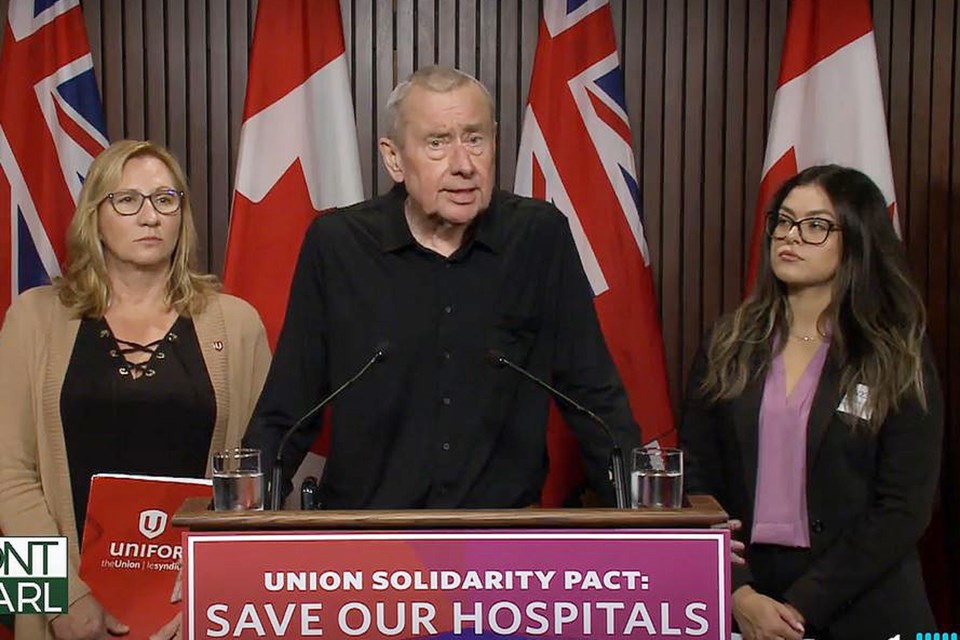As Ontario's health care unions prepare to enter collective bargaining with the Ontario Hospital Association, they announced Thursday they will stand united in the face of staff shortages and moves by the Ontario Conservatives toward privatizing health care.
The announcement, made during an online news conference from the Queen's Park Media Studio, began with CUPE/OCHO president Michael Hurley, who was joined by representatives of Unifor and the SEIU (Service Employees International Union).
"Our three unions are going into bargaining on behalf of the 90,000 hospital workers that we represent in the province of Ontario. And we want to put the crisis in Ontario's hospitals right at the forefront of the public's attention," said Hurley.
Hurley said the crisis includes such things as long surgical wait lists, long wait lists for MRIs and CAT scans and thousands of patients on stretchers in the hallways of Ontario hospitals.
Hurley said the situation is made worse by the fact there are 37,000 hospital job vacancies with an attrition rate of 12 per cent. He said there were 145 emergency room closures that occurred in Ontario last year.
Hurley said the unions had requested they take part in joint bargaining sessions involving all three unions. He said CUPE had done that previously with Unifor and with SEIU. Hurley said the OHA has refused to do that for the newest round of bargaining.
"We're bitterly disappointed," said Hurley.
"The hospitals have told us they have no interest in doing that, that they're interested in getting at the particularities of our collective agreements; which to us flags that they will be seeking concessions in this round of bargaining. And we're here today also to say concession bargaining is not going to happen," said Hurley.
And despite the OHA refusing to bargain with all three unions at once, the labour organizations have pledged to stand united, said Kelly-Anne Orr, the representative of the national office of Unifor.
"As we stand on the brink of crucial hospital negotiations with the Ontario Hospitals Association, our message is clear. We are united in our defense for public health care. And we will not be divided by the government or the Ontario Hospital Association. Together, our unions will achieve a fair contract for our hospital workers," Orr said.
"Every Ontarian deserves accessible, timely, and quality health care. It is the cornerstone of our society. And to have that we need a fair contract, good working conditions that encourages workers to choose the care that they deserve as a career," she added.
Sarah Correia, the director for the SEIU health sector, said there is a real fear that hospitals will push for concessions and spending cuts. She said this will affect many health-care wage earners.
"Hospital staff are falling behind in rent and mortgage payments. Yet hospital executives are going to push for real wage cuts. Hospital staff are coming together to defend access to patient care," said Corriea.
"Yet, hospital executives are going to implement Doug Ford's austerity agenda that defunds our hospitals, so wealthy investors can open for profit clinics," she added.
All three union representatives signed their names to a 10-point plan to stay united in their respective bargaining efforts with the OHA.
The full text of the solidarity agreement signed at Queen's Park is as follows:
Our unions commit to:
- Defend the patients who depend on the care we provide.
- Fight against privatization and the Ford government’s dangerous agenda to advance for-profit care.
- Solidarity of the 70,000 hospital workers in our unions to fight to save our hospitals.
- Press the government to have the OHA reconsider its decision to reject bargaining with our three unions at a common table. Should that effort not succeed, we pledge to coordinate our bargaining as if we were at a common table and to attend one another’s bargaining.
- Identify key priorities for this round of bargaining and campaign together vigorously on those priorities.
- Push the hospitals to provide safe, secure, and supported jobs.
- Take militant action, if necessary, to win gains for hospital workers and to protect our collective agreements from concessions.
- Dedicate significant resources to encourage and organize our respective memberships to attend in numbers any rallies, demonstrations, or picket lines related to collective bargaining.
- Stand with one another militantly against any legislation or government intervention that threatens to further undermine our bargaining rights.
- To accomplish this, we commit to regular meetings of our senior leadership and staff and to a joint session of our leaders at which this agreement will be signed.
Len Gillis covers health care and mining for Sudbury.com.
